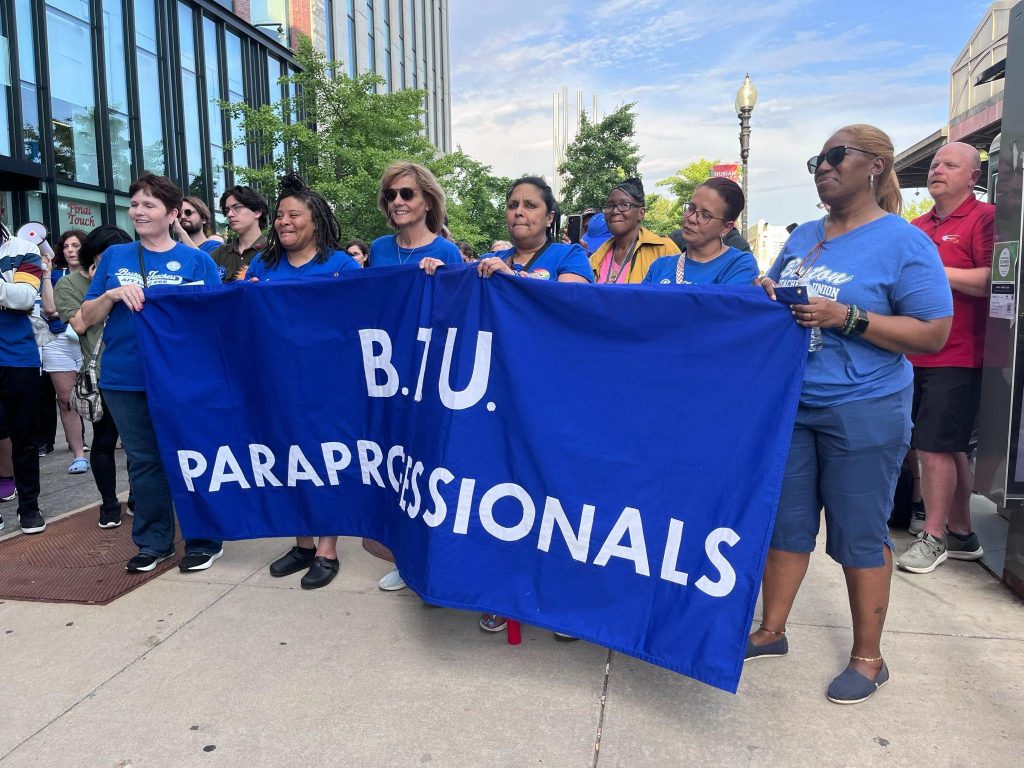[[{“value”:”
By Nick Lavin
BTU paraprofessionals hold a banner during their June 4th rally.
Across the state, school districts are slashing teaching and support staff positions. Hundreds have already been laid off across the state with more to come, while 70% of Boston schools might see cuts. It is in this context that the Boston Teachers Union (BTU) is bargaining for its next contract. Yet the union is excited to take on the District for fully-funded schools and programs as they demonstrated last Wednesday at their rally of almost 1,000 educators, staff, and community supporters.
The recent statewide school budget cuts are the result of $2.9 billion in pandemic relief money — the Elementary and Secondary School Emergency Relief Fund — drying up three years since it was first made available. School districts, state officials, and the corporate media have picked up on this fact to try to explain the budget shortfall to teachers and families. However, sitting in the background of this present crisis is Governor Maura Healey’s recent $1 billion tax cut, which largely benefitted the Commonwealth’s richest residents. The state had every opportunity to ensure that funding for critical services, including education, would be available for school districts; instead, through a cut to the estate tax, they gave that money to people inheriting estates valued over $1 million.
Working class students will undoubtedly bear the brunt of staffing cuts, as class sizes will increase while critical reading/writing intervention, health, and community services will be diminished.
In light of this, BTU’s top priorities include battling cuts to staffing, which the District is papering over as remodeling their inclusion plan (explained below), and ensuring existing staff are paid living wages.
While the state government cuts taxes for the wealthy and the City signs multi million-dollar checks for the police, the cost of living has increased substantially. Paraprofessionals are feeling it the hardest in BTU; many make as little as $30,000 a year.
Paraprofessionals are often charged with filling in gaps left in under-funded school systems, cracks that will only widen under the District’s new inclusion model, which BTU is strenuously resisting.
Students with disabilities benefit from maximum realistically achievable inclusion in general education classrooms — but only as long as the services they need are provided. In most school districts, this challenge is met by a full system of support staff and, where needed, multiple teachers.
Unlike every other school district in the state, however, Boston Public Schools (BPS) wants to require teachers hold multiple licenses to simultaneously teach general education, special education, and English as a second language students without additional support. With educator attrition already higher post-pandemic, BTU argues that increasing their burden through this inclusion plan will only worsen teacher retention and hiring. On BPS’ side, the motivation (cost-cutting) is painfully clear: if the district can employ one teacher with two licenses rather than two teachers with one each, they get one teacher ‘for free.’ But as BTU teachers reminded BPS last Wednesday, “two licenses is not two teachers.”
Since bargaining began in February, BPS has not met BTU on any of its more contentious demands; because of budget cuts, they say, everyone at the table must come together to make the difficult choice between a fully-funded inclusion model or paying paraprofessionals what they deserve.
BTU does not see the situation that way. At a rally last Wednesday of almost 1,000 union members and community supporters, the union called for BPS to come to the table and do what is right for paraprofessionals, for all education staff, and for their students. This is only the latest escalation over the past three four months, that has included a community petition and early morning ‘walk-ins’ – when teachers rally outside their buildings and enter the school chanting and holding signs.
The current contract is set to expire in August, but negotiations are likely to continue well past the summer. Last bargaining cycle, BTU members worked more than ten months without a contract until finally reaching a tentative agreement. As for what it might take to win a fair contract, readers don’t have to look far: Newton teachers only won big for their paraprofessionals and support staff after almost a year of negotiations — and a two-week strike.
Nick Lavin is a Boston Public Schools paraprofessional and a member of the Boston Teachers Union.
“}]]

